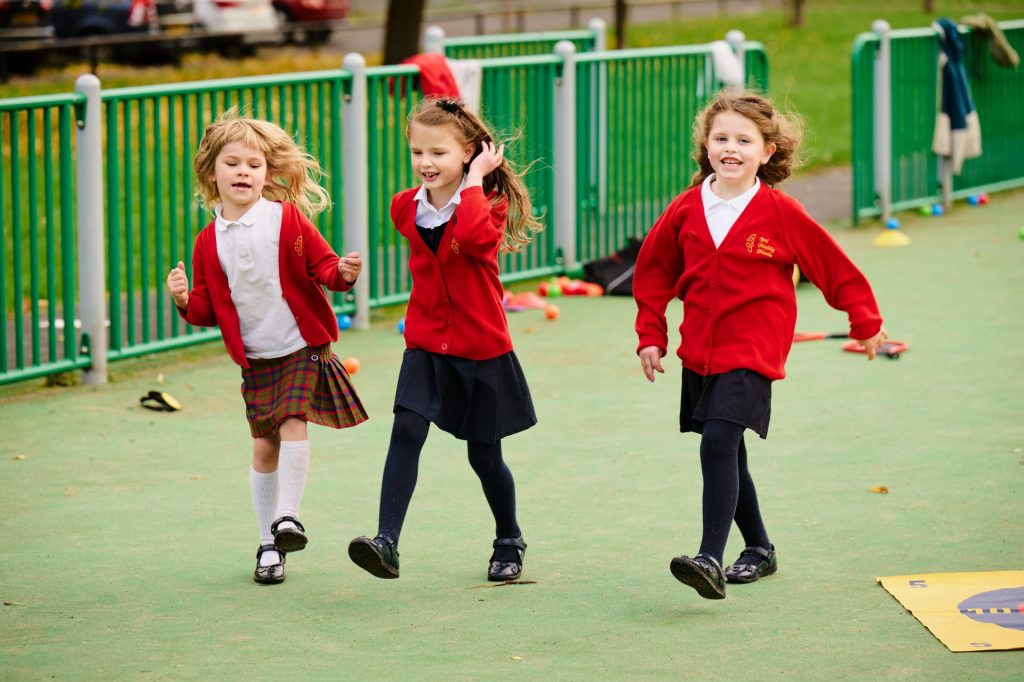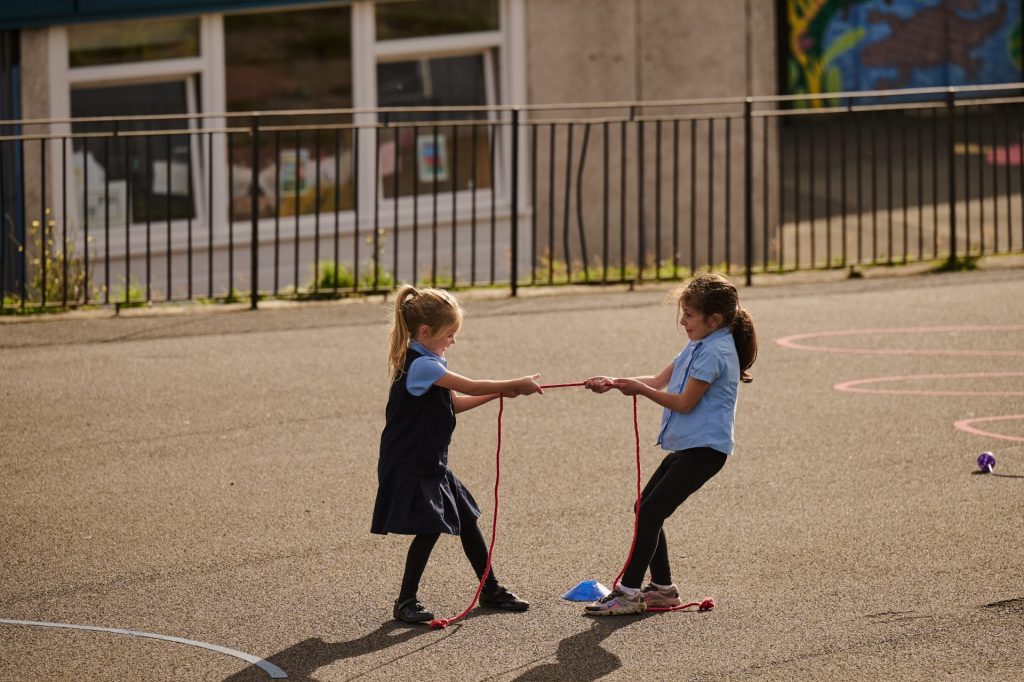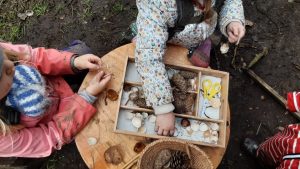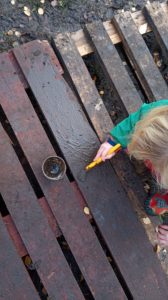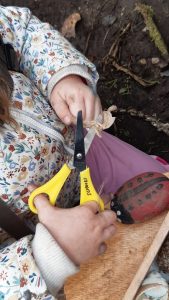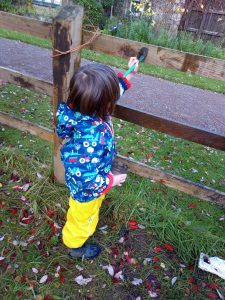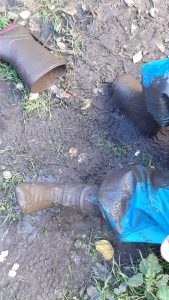Crowdfunder launched to raise £10,000 for children with care experience to create lifelong memories this summer
intandem, Scotland’s national mentoring service for children and young people with care experience, has today (Wednesday 31st May) launched a Crowdfunder campaign, aiming to raise £10,000 to help children create lifelong memories this summer.
All children deserve the opportunity to have fun and try new things to help set them up for a positive future. For children with care experience, the summer holidays may not offer the same opportunity to create these happy memories and they can miss out. Especially as the rising cost of living means many families in Scotland are struggling to stay afloat.
The intandem programme is managed and facilitated by Inspiring Scotland and will match every donation made during the campaign . All money raised will allow mentors and mentees to do something a bit more special during the summer holidays like visiting a zoo or theme park during their weekly meetups.
Julia Abel, Director of Funds at Inspiring Scotland said:
“We all have those memories of during the summer holidays – a trip to the beach, enjoying an ice cream or going someplace new. Those all-important things to talk about on the first day back at school.
“Many children with care experience, especially this year with the rising cost of living, are missing out. We want to go the extra mile and raise money for mentors and mentees to be able to do something a bit more special.
“intandem mentors provide children and young people with a consistent adult role model in their lives who is that one step removed from the day-to-day, who will empower them to be more confident and to feel heard.”
intandem mentoring is a proven model, where mentees have reported increased self-confidence, self-esteem, social relationships and has even seen many children and young people more positively engaged with their local community. Mentors help their mentees set goals and encourage resilience and confidence to succeed in life.
Donations can be made at crowdfunder.co.uk/p/intandem-summer-activities
Inspiring Scotland’s Specialist Volunteer Network (SVN)
For a charitable organisation, having access to a broad range of professional skills can be challenging when resources are already stretched. Whether seeking IT or marketing expertise, financial or legal advice, a trusteeship or practical help, Inspiring Scotland’s Specialist Volunteer Network (SVN) can step in. The Specialist Volunteer Network (SVN) is one of Inspiring Scotland’s unique offering to the sector – providing free support to charities across the country.
In 2021 our Specialist Volunteer Network team supported received over 583 individual requests for support which turned into more than 2000 hours of free support to around 200 charities. This support is valued at over £600,000.
SVN Executive Elaine Crichton leads the team along with SVN and External Engagements Coordinator Tommy Seymour.
With a network of over 500 Specialist Professional Volunteers, Inspiring Scotland provides a free, personalised service to match the skills of a volunteer to the support needs of the charity, creating a relationship that is fruitful for all involved. Being a bespoke, personalised service is what makes the SVN unique. “We could just be running a database,” said Elaine “But that’s how the magic happens, that’s just what we do. People will say ‘I didn’t think you could do that’ or ‘you’ve solved all my problems in one phone call.’
“Whether that’s saving you money, making you feel good, solving a problem that’s been giving you sleepless nights – it’s all of that and more.”
In 2021 the SVN team also launched its second corporate partnership cohort with Edinburgh-based global research and consultancy group Wood Mackenzie with 21 employees signed up to support five charities. Corporate partnerships can help to connect employees with their communities as well as identify transferable skills. According to Elaine “Corporate partnerships can help to connect employees with their communities as well as identify transferable skills. You are giving back and meaningfully contributing to social change.”
One of the charities supported during the year was Comunn Eachdraidh Nis based on the Isle of Lewis. Through SVN, Wood Mackenzie Professional Volunteers supported the organisation to review their business plan taking into consideration the impact of the pandemic and results of a community consultation.
Malcolm Dickson, Research Director with Wood Mackenzie, said:
“Working for these charities has been genuinely inspiring. The dedication of the teams and the scope of what they deliver is incredible.” Another organisation who have received a wide range of Specialist Volunteer support is PEEK, which supports children and young people in the East End of Glasgow. Support provided has been in a wide range of areas such as board governance and training, strategy development, IT training, digital and communications strategies and HR support for pay benchmarking”
Michaela Collins, CEO of PEEK said SVN had given the charity “amazing support”.
“Every request for pro bono support via SVN has been met and exceeded our expectations,PEEK would not be the same charity without unwavering support.”
Looking to the future, Elaine and Tommy want to expand the reach of the network in order to help even more charities to save time and vital funds. They are eager to spread the word about how the SVN can make a difference and see it as being a vital resources in the current cost of living crisis.
Tommy explains: “We have over 500 volunteers on our books and, last year we worked with just over 200 organisations, so immediately there’s more volunteers than support requests.
“Our long term goal is to have every volunteer deployed at some point in the year and, ideally, to be at a stage where we have no volunteers free, and be taking on more volunteers.”
Elaine adds that it is as straightforward as possible for charities to put in service requests:
“It’s as simple as send us an email or give us a call. There’s no form filling.”
There are over 25,000 registered in Scotland, and every one can make a request for assistance. Accessing this professional support can save charities time and money, allowing them to concentrate on frontline services.”
Celebrating National Mentoring Day
intandem is a Scottish mentoring programme which supports young people looked after at home. Volunteer mentors make the programme possible and the reason we’re able to make a real difference in the lives of young people.
A consistent, caring mentoring relationship gives children and young people the foundation to overcome trauma experienced in the past and most importantly intandem, offers a place for a young person to have fun. Mentors also create happy memories with young people.
To celebrate National Mentoring Day, Rachael who volunteered as an intandem mentor with partner charity Move On shares what it’s like being a mentor and why she got involved.
What interested you in becoming a volunteer mentor?
Hello, I’m Rachael! I’m 27 years old and live in Midlothian. I’m a full-time civil servant with a keen interest in photography.
I was interested in doing something to help kids in my local area and to give something back to the community. After a bit of research, I thought mentoring would be a great way to support and encourage a young person.
What sort of training did you do before becoming a volunteer mentor with Move On?
I took part in a comprehensive training programme with Move On before being matched with a young person . The training took place every Saturday for 10 weeks and covered areas such as: child protection, prejudice and discrimination, boundaries and identifying different types of abuse. I attended each session and completed supplementary homework tasks.
What support is available to you as a volunteer mentor?
I had a dedicated development worker from Move On who was always on hand to give advice, updates and support. Move On also run regular training sessions which are open to volunteers to sign-up.
What sort of activities did you do with your young person?
We enjoyed swimming, trampolining and library visits to read my young person’s favourite book ‘Grampa’s Great Escape’ by David Walliams. On some occasions we would visit a café for a bite to eat and a chat. During Covid-19 we mainly went for walks in the local area. We would always take a pair of binoculars for birdwatching and an instant camera to take photos for my young person’s journal. We also list the birds that we see on our walk.
What did you enjoy most about being a mentor?
The thing I enjoyed most was our conversations. . He made me laugh and I enjoyed being in his company. He is intelligent and funny and always had a great story or interesting fact to tell me. I found it very rewarding. We had such a good trusting relationship and I am pleased that he felt able to talk to me about anything he wanted to.
What’s your best mentoring memory
For my young person’s birthday, we went to the cinema to see the movie ‘CoCo’. We got popcorn, chocolate and tango ice blasts! We both enjoyed the movie so much we spent the whole car journey home singing the main song ‘Remeeeeeember me…’ from the top of our lungs.
What difference does having a mentor make to the life of your young person?
I think a mentor can make a huge difference to the life of a young person.
A mentor is someone who genuinely cares and always has an open ear to listen to the good things and the bad without judgement.
A young person can enjoy new opportunities, try something new, develop socially and grow in confidence.
What skills has being a mentor taught you?
I have developed strong communication skills which I think is central to a successful mentoring relationship. I have found that active listening is key to understanding how a young person is feeling. Being responsive, by showing interest, empathy and understanding, made my young person feel confident in talking and sharing things with me. These transferrable skills are essential in many areas of life.
intandem is a national mentoring programme, managed by Inspiring Scotland and funded by Scottish Government and The Robertson Trust. Intandem supports a portfolio of 13 partner charities, providing weekly mentoring for young people aged 8-14 years, living at home on a compulsory supervision order or in kinship arrangements.
Find out more on becoming a volunteer mentor.
Empowering women and girls through Active Play
To mark this year’s Scottish Women and Girls Sports week we want to highlight the positive impact of women and girls’ participation in sports and physical activity through the Active Play Programme. Using a partnership approach it is enabling children, and adults, to participate in, and in turn lead on Active Play across Glasgow and the rural Highlands.
It is clear that taking part in outdoor play, regular sports, or physical activity is good for individuals and communities.
However, despite this, nearly 60% of girls don’t meet the recommended exercise guidelines. Research from Women in Sport shows that at the age of nine, many girls have already been put off sport and over 40% of girls have dropped out of all sports activity by the time they reach their teenage years. We must change this.
We believe that Active Play can be part of the solution to this national problem.
Active Play combines grassroots delivery of inclusive active play, with training and support, so that children have access to more fun and inclusive active play and adults can understand the principles of Active Play and be confident in implementing it. The more adults who are able to continue to facilitate active play, the more active play for children.
Since 2016 Inspiring Scotland has have worked in partnership with Glasgow City Council to deliver Active Play to 5,000 children in 147 primary schools and this year will bring the programme to the Highlands in 3 primary schools, benefitting around 360 children.
Active Play is typically delivered over a 15-week period for 1 hour per week with 30 mins of structured active play led by a trained charity leader and 30 mins of outdoor free play activity. The sessions can take place in a school, nursery, or community setting. And the approach is underpinned by three drivers: Fun, Active and Inclusive.
Bringing the fun back into physical activity can be a huge incentive for engaging women and girls in sport. The team of partners collaborating on the programme also understand the importance of involving the children, and those who care for them in a way that promotes confidence, leadership, and ownership – boosting motivation and physical competence.
The Active Play programme is backed by evidence from a PHD doctorate, internal and external evaluations. We know it is building children’s resilience, confidence, and self-esteem. Data has also shown children have improved relationships, physical ability, negotiating skills, energy levels/stamina, confidence, and happiness all being improved.
Teaching staff are also recognising the benefits with many continuing to deliver Active Play after the programme has ended. Feedback has also suggested that physical activity/literacy levels have been further enhanced by 74% children taking up/planning to take up new sports clubs or activities after school. In addition to 80% participating in more active play at breaks and lunchtime, or at home.
The Value of Partnerships
The Active Play programme would not be possible without the expertise, knowledge, and resource from a range of partners.
Actify lead on the CPD training of all adults involved in the programme and provide a centralised place for learning and sharing of best practice. Check out the Active Play hub here: https://actify.org.uk/activeplay
Having professional play experts leading Active Play on a weekly basis is crucial to the success of the programme. These positive and trusted role models bring their expertise, cooperative working practices and shared learning and is enhanced by the ongoing CPD delivered by Actify. Additionally, the play charities provide a bridge between communities/families and schools; providing wraparound support to the most vulnerable children across Glasgow.
Inspiring Scotland’s role has been central to the ongoing strategic development of Active Play. From inception to now, working closely with Glasgow City Council Education Department, PEPASS, teachers, schools, and other stakeholders across the country and the grassroots charities to ensure a joined up and complementary approach.
If we value the health and well-being of girls, and all children and want to create a future of young people and adults who enjoy being physically active then we must continue to work together to remove barriers. We can provide more and better active play, physical activity and sporting opportunities which are fun, active, and inclusive and become a fundamental part of growing up in Scotland.
 For more information on the Active Play programme please feel free to drop me a line Melodie Crumlin, Thrive Outdoors Fund Manager melodie@inspiringscotland.org.uk or follow on Twitter @Melodie_Crumlin
For more information on the Active Play programme please feel free to drop me a line Melodie Crumlin, Thrive Outdoors Fund Manager melodie@inspiringscotland.org.uk or follow on Twitter @Melodie_Crumlin
Supporting the South of Scotland Enterprise Additional Support Needs (ASN) Learning Network
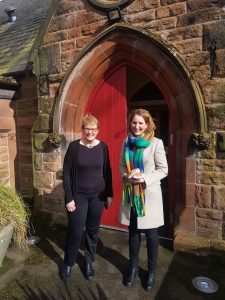 Sally Cavers shares some insight into the work she has been leading with South of Scotland Enterprise bringing people together as a collective to learn and share and create positive change.
Sally Cavers shares some insight into the work she has been leading with South of Scotland Enterprise bringing people together as a collective to learn and share and create positive change.
Background to the Network
The Additional Support Needs (ASN) Learning Network grew from a joint concept between The Usual Place of Dumfries and Borders Additional Needs Group (BANG) in the Scottish Borders, two organisations that work with people with additional support needs in the South of Scotland.
It was created out of a desire to support knowledge and awareness of good practice and to make connections to improve the employment opportunities for people with additional support needs. Founding members had experienced great work across the region but difficulty in knowing what opportunities are available in employment for people with additional support needs and how these opportunities can be better supported. It is funded by the South of Scotland Enterprise (SOSE) and facilitated by Inspiring Scotland.
The ASN Learning Network helps to share best practice and innovation in employment for people with additional support needs in the South of Scotland region. Collectively network members identify where gaps are in service provision and co-develop solutions which will help to inform the regional economic strategy. Economic recovery is a priority area for SOSE and by funding this work it demonstrates our commitment to Fair Work and Equalities which are vital planks in our strategy. It is key we develop our skills and people in the region and to make sure that we create and sustain new jobs that are fulfilling, well rewarded and secure. The ASN Learning Network will provide the connections and analysis to make this a reality.
Kathy Cremin, Communities Specialist, South of Scotland Enterprise
About the Network
The network is made up of almost 40 individuals from local and national third sector organisations, local authority teams, school staff, Skills Development Scotland, and others. Members meet every two months to explore key areas of focus, look at good practice examples and decide how to progress things that hamper improvement. Members are committed to contributing to change for people locally that sees an inclusive approach to work in the region. The Network was established in October 2021 and is a two-year pilot.
We need the network to help us all to harness the full potential of individuals across the South of Scotland and supports places across the Borders and Dumfries and Galloway that enable people with additional support needs to thrive. Young people with additional support needs have the right to contribute to a society that recognises and provides opportunities for their participation in the labour market. The network is making the connections and enabling the conversations that will make this happen.
Heather Hall, Director Inspired Community Education Trust
What has happened so far?
Our work initially focused on creating connections across the areas, facilitating meaningful discussion primarily through network sessions.
The network sessions include spotlights highlighting good practice, this has showcased organisations and projects that members were not aware of. The Scottish Borders is one of the 10 local authorities that is trialling the Principles of Good Transitions: Principles into Practice approach developed by ARC Scotland. Members learned about how to improve young people’s experience of preparing to leave school and were given insight into the tools developed that they will be using as the model rolls out.
The first feedback report summarised network members’ contributions to discussions about what was needed locally and what would make a difference. Members had discussed the barriers to progress for different age groups and the report summarised these for readers. This provides a baseline for evidence of success as the network develops throughout its test period.
Participation is really deepening my understanding of the connections we need to make for change.
Network member
Part of Inspiring Scotland’s role is to amplify the views and experiences of people with additional support needs in relation to employment. At Inspiring Scotland we place lived experience at the centre of our work and want to engage with people who experience challenges most directly. We can do this by listening and designing services in partnership with those they serve.
A session with a Borders youth group provided the opportunity for creative engagement and young members to share what would make a difference for them. This evidence will be used to further support the case for change. The network is amplifying the views and experiences of people with additional support needs in relation to employment.
One of the specific blocks raised by several members and people consulted as a barrier to employment for people with additional support needs across the region was transport.
A young person with additional support needs sharing their views about employment locally said there is a need for more opportunities – not just saying “no” – even for volunteering and more job opportunities that can be done remotely, so people are not limited if they can’t get around. Funding needs to be available for travel.
The network enables sharing of solutions between cross sectoral members who do not usually have this opportunity and can share ideas for example on funding for transport.
As the network approaches it’s one year anniversary in October, Sally and the team are looking forward to continuing this work with South of Scotland Enterprise. 
If you are interested in this area of work, contact, Sally Cavers, sally@inspiringscotland.org.uk
You can stay up to date with the work of the the network:
Key Themes from Peer Support for Dads
Monday 20th June marks International Father’s Mental Health Awareness Day. Earlier this year, the Inspiring Scotland PIMH team alongside Scottish Government hosted an online event: Perinatal Peer Support Scotland. The aim of the session was to recognise the contribution of peer support workers; showcase good practice and highlight the role of peer support and how it can complement clinical services.
One of three sessions focused on Peer Support for Dads. This session was chaired by Douglas Guest from Home-Start and the panelists included: Chris Miezitis from Fathers Network Scotland; Greg Borthwick from Dads Rock; and Doug Marshall from Home-Start Glasgow South.
Three key themes that emerged from the peer support for Dads discussion:
- It is a myth that dads don’t want to talk and share their feelings
Participants reflected there is a stereotype that dads and men don’t want to talk. Chris from Fathers Network Scotland stated that this is a myth, and that dads do want to share their feelings and be included. It was suggested that when trying to get dads to engage, it is important to provide dads with the appropriate space to allow them to talk freely. It is also important to take into account potential barriers that are preventing dads from engaging with services such as cultural stereotypes and systematic barriers.
- The importance of recognising dad as a parent
It was pointed out that throughout the peer support event, the word dad or father was rarely referenced, and that nearly all images used in perinatal services only feature women. This can further isolate dads. Participants raised thatdads want to be an asset to the development of their child, and are therefore keen to be heard and supported. It is important to break down damaging stigmas and realise that men want to be involved in their children’s lives; having a well-supported dad results in a better supported family.
- It is important that services are tailored towards dads
Frequently, dads feel excluded from perinatal services and may feel intimidated by the current services that are on offer. It was suggested that having peer support workers who have lived experience is a powerful and effective means of encouraging dads to engage with services. It was stated that lived experience should be front and centre of any peer support work. Greg from Dads Rock said that it can be tempting to replicate services that are tailored for mums, however he argued that this is ineffective as men face different issues and challenges in the perinatal period. This confirms the importance of including lived experience as it allows the services to be designed with dads needs in mind.
It was clear from the group discussion that dads can face a great deal of stigma and may be reluctant to utilise available services offering support. This highlights how powerful it is to have lived experience involvement in the design and delivery of services to make support as accessible and relevant as possible.
Monday 20th June marks International Father’s Mental Health Awareness Day, where we will be talking about how up to 10% of dads experience mental health challenges in the perinatal period.
For more information and how you can access support, please visit Father’s Network Scotland’s website: https://www.fathersnetwork.org.uk/
Supporting Women, Reducing Harm: Supporting a National Conversation
In April, Inspiring Scotland’s Perinatal and Infant Mental Health team co-hosted Supporting Women, Reducing Harm, the first-ever national conversation on how services should care for families affected by substance use in the perinatal period.
This event was in partnership with Scottish Government, Perinatal Mental Health Network Scotland, NHS Scotland, third sectors partners and women with lived experience. It followed the 2021 report Supporting Women, Reducing Harm.
Evidence shows that using drugs or alcohol during pregnancy and the postnatal period negatively affects the physical and mental health of both mother and infant. There is a recognised need to improve the services available for substance-using women and their infants during this time and this was the starting point for the Supporting Women, Reducing Harm event.
The conversation brought together individuals and organisations with expertise in maternity and child care, substance use, and maternal and infant mental health, alongside women and families with lived experience, to develop recommendations on models of service provision for Scotland.
The attendance of so many stakeholders ensured a dynamic discussion that reflected the broad experiences of the participants. Over 300 people joined the day, representing many different sectors across the breadth and width of Scotland – the Borders, to the Shetland Isles.
“One of the things that made this event so special was that it brought together a cross-sector audience from Scottish Government, NHS, local authorities, charities and more. Bringing together and leveraging that level of collective insight and experience will be key for unlocking the challenges that face women and families in Scotland.” Leanne Anderson, Perinatal and Infant Mental Health Fund Manager, Inspiring Scotland
Prior to the online session, women with lived experience were interviewed to help shape the agenda and discussions. During the day, Sharon Graham represented the voices of lived experiences and spoke impactfully, clearly stating that now is the time for action:
“We had a coming together of professionals and lived experience, working in collaboration due to having one thing in common, wanting the best outcome for those we support. The time has come to change the “us and them” scenario and for action to happen.” Sharon Graham, Voice of Lived Experience
The event had really positive feedback from the attendees:
“This was an incredible, inspirational and truly exceptional event – very heartfelt and it was so good to see how many people were in agreement of supporting women and the challenges life brings to them. Captivating and extraordinary. So pleased to see the collaborative recognition of this and great to hear from real people with lived experience” Attendee
“The passion and wish to collectively make a change was palpable. It felt like the right feet were around the table.” Attendee
Several key themes emerged:
- It is important to take the time to listen to women involved and find out what their needs actually are (not to make assumptions)
- A wide range of third sector organisations play an important role in delivering flexible, non- stigmatising support
- Joined up services and solid wraparound care are critical as they make it easier to access support and avoid women having to repeat their story multiple times to different services
- There is a greater awareness of the need to reduce stigma, given the clear impact that stigma has on women and their families accessing services
At the start of the session, Angela Constance MSP, Minister of Drugs Policy, announced a short-life working group to further examine the issues and make recommendations for future support. Kevin Stewart, Minister for Mental Health and Wellbeing, closed the day, thanking participants and assuring us all that the work would be taken forward.
In terms of next steps, Scottish Government are currently developing the process for membership of the short-life working group, more information on this will follow in due course, and Inspiring Scotland are creating a report based on all feedback received on the day.
We would like to thank all partners and attendees involved in the event and especially those with lived experience. Thank you for sharing your experiences so openly and honestly to help improve support for families across Scotland.
Further information
- Read the full set of Supporting Women Reducing Harm Event slides and feedback
- Read the original Supporting Women Reducing Harm Report
- Read the report ‘Families Affected by Drug and Alcohol Use in Scotland’
Matt Baker guests blogs on Creative Communities programme after attending its showcase earlier this Month.
Artist and founder of the Stove Network, Matt Baker guests blogs on Creative Communities programme after attending its showcase earlier this Month.
Firstly, I’d like to congratulate everyone who took part in the Creative Communities programme – from those who first thought up the idea and made it possible – to everyone who has been involved in the 46 communities across the country. As an artist myself I know how exposing and vulnerable it is to put your artwork out in public view and I want to say a particular big up to everyone who has works in this wonderful show – you are all legends!
I am a community artist and when I look at works like these I find myself dreaming a little and reaching into what people are wanting to say about their world. And then imagining a little further into what was happening when they were made. I see the chats, the new friendships formed, the deals made in families to make the space to be there, conversations about shared places and people, the advice given on local issues, the dreams of change, the new skills learned and the new understandings of who we are as people.
Through this lens we see something fundamental about this approach to creativity and culture. We see how taking an active part in making culture, as participants, gives us so much more than the satisfaction of self-expression and making something to show to others. It creates new connections in communities, new stories and knowledge that bind people together in deep ways. Ways that combat the isolation and anxiety that plagues our society and leads to breakdowns in people, families and the fabric of community that should support us all.
As well as health, and skills, and justice benefits, these projects can spark new confidence and ideas that lead to new projects to improve places and sometimes even new enterprises and businesses.
Research study after research study has shown active participation in creativity leads to happier people and happier places. And yet we have all grown up with the idea that culture is not made by the likes of us, it is made by special people and our role is just to admire it, not be part of making it. Projects like this give us a glimpse into another possible world. A world where it is completely normal for everyone to be creative and be part of making the culture of Scotland.
- Imagine if at school all our creativity had been nurtured, be that in singing, gardening, cooking, den making or making up stories.
- Imagine if every town and village had a community festival where everyone took part and it was one of the ways that places welcomed new people into being part of their future.
- Imagine too what such a vision would mean for those working in the arts. Long term jobs working alongside communities, jobs that would support other parts of their careers and help make amazing art that would put us on a world stage as a country, where we value things differently and put people first.
If we are going to move to a way of doing culture in Scotland that is centred on participation, then we need a plan that brings into being creative projects in education, in health, in community development and regeneration.
And we also need a progression pathway of projects like Creative Communities that work at the grassroots of places and start to build networks and skills so that larger projects can then take root in those places and arts workers can gain experience too. The sister project of Creative Communities is called Culture Collective, it currently has 26 projects of regional scale running around Scotland. Reading the Creative Communities report and looking at the great work in this exhibition, it seems obvious to me that Creative Communities could work as a learning pathway towards a Culture Collective project in these places in the future.
As a country we have a wonderful folk tradition of collective creativity through stories, songs and ceilidhs. In the context of Covid, the mental health crisis and the climate emergency we can see that the old solutions are just not work working anymore. They are tearing us further apart. We have to try something new, something that brings us together again. Creative communities has been showing the way in 46 places around the country and as we say in Dumfries “may it continues on!”.
Find out more about the showcase event.
Find out more about Creative Communities programme.
10 ‘Beautifully Ambitious’ Years of Link Up
Andrew Magowan, Link Up Programme Manager shares his reflections on Inspiring Scotland’s Link Up Programme turning 10.
My colleague described our plans for the celebration as “beautifully ambitious”. True, but the phrase is also a great way to capture the essence of Link Up since its launch in 2012.
Link Up was never really a programme, more a way of working; a mini movement seeking to harness the strengths and will of local people to affect change. Our aspiration was significant: to embed an approach that tackles disadvantage by empowering local people to help themselves, each other, and their community.
It’s impossible to do justice in this blog to what has been achieved and learned over the past ten years. But in keeping with our theme, I like to think we were ‘Truthful, Useful and Hopeful’[1].
Truthful
Whilst we have made critical steps towards our aspiration, it remains work in progress. However, thousands of Link Up participants have made material improvements to their lives, setting themselves on a path to a brighter future. Equally, Link Up has initiated community responses that are offering significant potential to deliver wider and enduring change.
Such successes run through our work, but I trust never in a sugar-coated way. We have always tried to shine a light on the reality of people’s lives. Those lives are often challenging beyond belief. And as we have demonstrated time and again, people’s journey is all too often marked by a cycle of crisis-stabilisation-recovery-crisis-stabilisation…etc.
As a corollary, achieving meaningful progress takes time, often years. It is a position we accepted from the outset, giving our workers permission to operate at the pace of the individual, recognising that their (and/or other community members’) sustained presence in the life of that person is often the most valuable gift we can provide.
Interestingly, Link Up’s unorthodox way of working (often pastoral) proved challenging for many of our hosts in the early days of the programme. However, we had courage in our convictions, and by sticking to our principles and evidencing the power of our approach, most hosts became strong advocates and, with our workers, key enablers of our day-to-day work.
We also sought to challenge convention on the nature of a programme like Link Up. It would be easy to frame it solely in terms of community development. We prefer to explain our approach as being as much about human development as it is about community development.
Where we have more to do is in influencing the wider adoption of the learning from Link Up. The economics of public spending is largely behind this. However, there is a need to influence a wider rethink on why and how we invest in communities. Critically, to have greater ambition, supporting communities to ultimately become regenerative. More on this below.
In part, our inability to realise this influence, is a function of how we framed our language. For too long we adopted a ‘build it and they will come’ mentality i.e. establish Link Up, people will make change happen and problems will be overcome. What we are learning now is that we need to illuminate the ‘line’ from individual action to collective action, to co-production of local solutions, to broader place-based working, to the creation of a regenerative community.
Useful
Since 2012, we have sought to measure the impact of our work and understand how that impact has been affected. This has helped to inform and shape policy and practice in numerous areas including asset-based working, place-based working, trauma-informed practice, health inequalities, community empowerment, community safety, public sector reform and Covid responses.
Whilst our work has shone brightest on aspects of social regeneration, particularly in relation to health and wellbeing, it is also highlighting a development approach to the creation of a regenerative community. This is one in which local people and organisations overcome the seemingly intractable problems that blight so many places and are delivering sustained and progressive renewal in social, economic, environmental and democratic terms.
At the heart of this approach, is an understanding that we are dealing with a human and therefore, relational system.
This framing has been at the core of our way of working since launch. It is writ large through everything we do: our pace; being interested in and taking time to understand people’s lives; creating welcoming spaces without agenda; focusing on human, not statutory needs; illuminating and using people’s strengths to build connections and make change happen; intensive 1-2-1 support. Our local workers have been the driving force for this.
Our 2016 paper, provided insights into the personal and situational factors that make our workers so effective in this regard. For me, it remains a ground-breaking piece of work that informs how we identify, encourage, recruit, develop and support the workforce that will be essential in taking our aspirations for renewal in our communities to scale.
The role our workers play is physically, mentally, emotionally and spiritually draining. It is testament therefore to their resilience and perseverance, that almost half of our 17 workers have been with us for over seven years, two since 2012. It’s a fact that I am perhaps most proud of because it talks to the quality of care and support we have given our workers.
For our workers, four things stand-out:
- giving them space and encouragement to be themselves and not be afraid to take risks;
- acting as a supportive buffer between our workers and their host by helping the latter to understand the challenges of a worker’s role;
- regular emotional and practical support including access to psycho-therapy support, reflective practice sessions and continuous professional development (e.g. trauma, bereavement and suicide informed practice; mediation and conflict resolution; nonviolent Communication);
- removing the burden of most fundraising and reporting responsibilities.
Hopeful
The principal enabler of the above and everything that Link Up has achieved, has been Scottish Government. Ten years ago, they chose to invest in a programme that was arguably at the cutting-edge of community-based work, but one that also carried significant uncertainty in terms of its evolving approach and the impact it would have.
For me, this commitment is a powerful demonstration of the invaluable role Scottish Government can play in taking risks to test new ideas and prove what works and what doesn’t work. It is a role few other public sector bodies would be prepared to take, but one which will be essential if we are to turnaround growing inequalities and rising poverty.
I would also hold up our experience as being an exemplar of strategic partnership working and as such, a model for future relationships. Firstly, Scottish Government’s continued financial support has been instrumental in helping us to leverage additional funds such that 41% of our 2022-23 funding will come from non-Scottish Government sources.
Additionally, our ability to engage with and share learning across Scottish Government Directorates has been mutually beneficial; helping to shape policy and help us to understand how we might contribute to the delivery of national outcomes. I also like to think that being funded by Justice, Health and Regeneration has helped build cross-Directorate relationships, contributing for example, to a wider dissemination of understanding on place-based working.
I trust my Scottish Government colleagues feel we have repaid their trust in terms of impact and the rich learning Link Up generates. Sharing that learning and seeing it inform policy and practice has, I hope, been as energising and motivating for them as it has been for us.
But perhaps the single most valuable outcome of this learning has been what it tells us about the power of local people to make change happen. I recall in the early days of the programme a story about a Link Up participant securing her first job after being unemployed for 15 years. Most evidence suggested she would never work again. And other more recent stories including a woman having the courage to leave an abusive relationship and another changing her life to such a degree she regained access to her child.
These transformational shifts speak to the potential in our communities. A potential that Link Up has only scratched the surface of but is undoubtedly our greatest asset in our fight against inequality.
Taken together, the experience of the past ten years gives me hope; “not the conviction that something will turn out well, but the certainty that something makes sense, regardless of how it turns out” (Vaclav Havel). That ‘something’ is the collective understanding that Inspiring Scotland and others[2] are accumulating on how we build a brighter future for our most disadvantaged communities. If we use it wisely, the type of change we have so long sought for our communities and the people who live there is within reach.
[1] The character of Patricia Westerford in Richard Powers’ 2019 Pulitzer Prize-wining, “The Overstory”, uses these 3 terms as a framework to guide her writing in the final chapter of her.
[2] See especially, Corra Foundation (via ‘Getting Alongside Communities’), Scottish Community Development Centre (via ‘Strengthening Communities’), SURF (via ‘Alliance for Action’), National Lottery Community Fund (via ‘Our Place’), Creative Scotland.
Thrive Outdoors Blog Series: Case Studies- the children’s experience
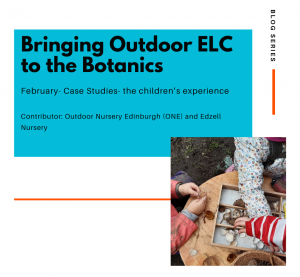 This month for the sixth instalment of our Botanics Blog series we hear from the two nurseries taking part in the pilot- Outdoor Nursery Edinburgh (ONE) and Edzell. Both nurseries share their own case study on a child’s experience of ‘The Wee Garden’. Hearing about the difference this outdoor space has made to each child is truly remarkable.
This month for the sixth instalment of our Botanics Blog series we hear from the two nurseries taking part in the pilot- Outdoor Nursery Edinburgh (ONE) and Edzell. Both nurseries share their own case study on a child’s experience of ‘The Wee Garden’. Hearing about the difference this outdoor space has made to each child is truly remarkable.
ONE (Outdoor Nursery Edinburgh) Case Study- Rosie*
There is a particular type of feeling that comes from being in an outdoor environment surrounded by nature. There have been many recent studies that tells us of the benefits of being in nature. It not only lifts us emotionally but physically reduces our production of stress hormones among many others. This is most evident to me when we have children who need support with their emotions – they might be nervous or shy or have other emotional challenges, but the same change happens when we play outside. They are immediately more settled, curious and have the freedom and space to explore. They are able to build on their own learning at their own pace and it is an absolute joy to watch.
Rosie* has recently transitioned to our 3-5 room. It’s been a tough couple of years for everyone but especially for those little ones who need encouragement to find their confidence. We have always supported Rosie* in finding her confidence and as time has gone on, she has slowly come out of her shell.
Over the time that Rosie* has been with us in our 3-5 room she has been gaining in confidence, but most noticeably is when we are spending time outdoors and especially at the Botanics. *Rosie has been able to express herself and make choices about her own learning. She has really enjoyed the experiences set up there, such as the threading, making patterns and has had the space and time to form friendships with others in her class.
By observing *Rosie at the Botanics, we have been able to see her taking part, asking questions and choosing which experience she is interested in taking part in.By allowing that space and time in an outdoor environment we have seen a growing of confidence that I believe wouldn’t have grown in the same way, had we spent the time indoors. It’s been a real pleasure to watch her find her voice and be able to express herself in what can be a very noisy and hectic world!
Edzell Case Study- Michael*
Michael*, aged 3, comes to Edzell nursery full time and has participated in the Botanics ‘Wee Garden’ pilot since the start. At nursery, he was a child who preferred to stay indoors and would not go outdoors spontaneously. He often had to be encouraged and he would give clear explanations as to the reasons why he wished to stay indoors or sometimes he would simply say a flat no. In addition, when we first started, we walked from nursery to The Wee Garden and this often proved challenging as he found the walk plus the time at The Wee Garden quite taxing. Although, we perceived as we wanted him to develop his physical skills and his overall health and wellbeing through participating. However we had to respect his voice and find a balance between what he wanted and the wishes of his parents and the nursery. Therefore, after some discussion with the nursery, Michael’s* parents decided to reduce his hours and build up his stamina, so he stopped doing the visits to the Wee Garden for a short time in the Autumn term and the staff were very intentional in trying to get him more physically active at nursery and building his enjoyment of the outdoors.
When Michael* returned to full days and came back to The Wee Garden regularly, he was going outdoors regularly at nursery and he was seeing the children extending experiences that they had at The Wee Garden at the nursery, which encouraged him. He chose the date of his return with his parents and he came back with enthusiasm. Although the walk back and forth was still a challenge for Michael*, he could now cope but when we changed to using the bus to gain more time at the garden, he was very happy! He joined in with all the activities including the mud kitchen, digging, using the loose parts to build dens and ball runs and explored the area in various ways alongside the other children.
Now that we have come to end of the pilot, Michael* has shown a huge improvement in his overall health and wellbeing in several ways. His stamina at nursery has increased so there is no longer a big drop in energy at the end of the week, which was previously sometimes the case. He goes outside regularly with no encouragement, puts on his waterproofs easily, with just a little help to put the legs over the wellies ‘so the mud doesn’t go in’. Michael* was one of the children who benefitted the most form the experience particularly with regards to his physical health. Where he struggled with the walk there and back, he is now physically much more able and has gained increased endurance and now has enough energy to last the whole day. His focus has increased and at home his parents have noticed greater overall stamina and better sleeping.
* Please note each child’s name has been changed for safety purposes.
Enjoy this blog? Then keep an eye for the very last blog in this series going live on the 18th of March where we share our reflections on the pilot outdoor nursery at the Botanics.
Join in the conversation or just chat with us at:
Facebook @ThriveOutdoorsScot
Twitter @Thrive_Outdoors
Instagram @thrive_outdoors
or by email to amy@inspiringscotland.org.uk
Useful links
Find out more about Outdoor Nursery Edinburgh (ONE)
Find out more about Edzell Nursery
Read our previous blogs and scroll down to the bottom page ‘Our news’ section.

